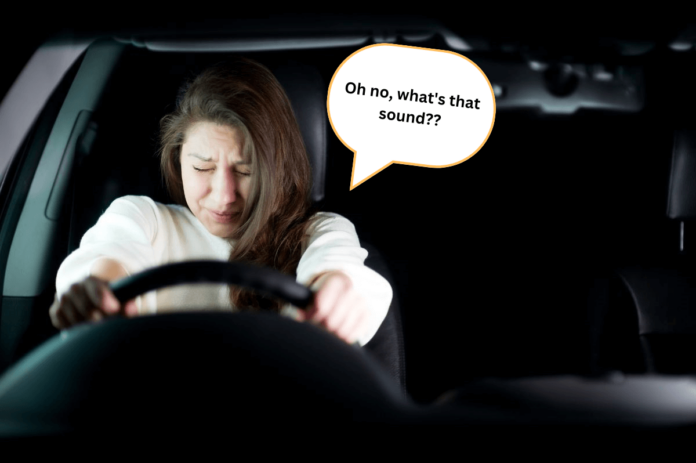A car with problems or in need of immediate maintenance will usually show symptoms, sounds, or specific signs. That’s why it’s always a good idea to pay attention to unusual noises from your car be it while driving or stationary. Typical car noises that could signify problems include buzzing, ticking, humming, and other odd noises from the engine or other parts of the car.
If these noises are only a one-off occurrence, they might be nothing to worry about but if they persist, they are most likely a sign that something is wrong.

Common Car Noises & What They Mean
Knowing the common problem noises in a car can help you identify what’s wrong and fix it early. By doing so, you’ll be able to prevent the issue from getting worse and avoid racking up higher repair costs. Here are some of the common car noises and the like problems causing them.
1. Squealing Noise from the Engine Bay
A squealing noise from the engine is usually caused by a loose or worn serpentine belt. This belt powers various parts in the engine including the alternator, water pump, power steering, aircon compressor, and radiator fan. If a faulty serpentine belt can’t power up the alternator, it can’t charge the battery so you wouldn’t have enough power for some functions including starting the engine and powering the lights.
If you notice a consistent squealing noise from the engine accompanied by lights or electronics that don’t function as they should, it’s most likely time to get your alternator fixed or replaced.
2. Ticking Noise from the Engine Bay
If you hear a ticking noise from the engine, you could have a low engine oil level or a faulty timing belt. However, if you check your engine oil and see that it’s at a normal level, the source of the noise is most likely the timing belt. The timing belt connects the camshaft to the crankshaft and helps the engine pistons and valves move at exact timings. This ensures proper combustion and allows exhaust gasses to exit the engine.
If you notice ticking coming from the engine bay, it’s likely caused by a damaged, loose or worn timing belt that is hitting against the timing belt cover as it spins. Take your car to a workshop for immediate inspection as a damaged timing belt can affect the performance and efficiency of your car. If you leave it unchecked, the timing belt could snap leading to extensive engine damage and a hefty repair bill.
Read More: Common Car Issues That Can Catch You by Surprise
3. Popping, Hissing, or Ticking Noises from the Exhaust
Usually, a faulty exhaust system can be identified through the sounds it produces. Interestingly, every sound produced by the exhaust system indicates different symptoms and problems faced by your car. Most exhaust problems can be detected while revving the engine so you may need to listen for noises from your car’s exhaust while driving to be sure. Take your car to the workshop if you detect any strange sounds to avoid more serious damage. Here are some common problematic noises associated with a car’s exhaust system.
- Chugging sound: This sound is similar to a steam train chugging along its track. If you notice your exhaust chugging, you could have a clog somewhere in the exhaust.
- Hissing sound: There may be a leak in the exhaust system, or a clog in the exhaust could be forcing the fumes to escape out of other orifices.
- Rattling sound: The exhaust could be misaligned or there could be loose mounting brackets.
4. Squealing or Grinding Noises When Using the Brakes
Squealing brakes happen when the wear indicator becomes exposed on a thinning brake pad and grinds on the brake rotor, thus producing a screeching noise. If you hear this noise while braking, get your brake pads checked and replaced immediately.
Read More: How To Know If Your Brakes Are Failing? Here Are 8 Signs To Look Out For

5. Clicking Sound While Turning
If a clicking sound occurs while turning, especially through sharp turns or while making a U-turn, it may indicate a problem with the CV (constant velocity) joint of your car. The CV joint is an important part of the drive shaft or propeller shaft of your car. It provides flexibility in wheel movement, efficiently transfers power to your car’s wheels, and ensures that they rotate at a consistent speed.
If this component is worn or damaged, it could leak oil, which will then affect the smoothness of the axle’s movement. If you notice this noise, get your CV joint checked immediately as you could end up with a much higher repair bill if you need to replace the entire car axle.
6. Thudding or Thumping Noises from the Car Tires
Your tires can produce a thumping or thudding noise when they have uneven surfaces. This can be caused by low air pressure in the tires or uneven wear. If this situation occurs, first check your car’s tire pressure and ensure it’s at the level recommended by the manufacturer. However, if the noise persists even after inflating the tires, you should check your tires for irregular surfaces such as bumps or bald spots.
Uneven wear on your tires is mostly caused by poor wheel alignment. In the long run, this could result in reduced comfort on the road, higher fuel consumption, as well as increased wear and tear on the tires and suspension components.
Read More: Upsizing Your Car’s Tires: Is Bigger Always Better?
7. Clunking Noise While Driving
If your car makes a clunking noise when it goes over bumps, you could have damaged or worn-out shock absorbers. Check your car immediately if you detect a clunking noise while driving because if not fixed immediately, it can affect the car’s suspension, steering, and braking systems. In addition to the noise, you can also detect signs of shock absorber damage with the following signs:
- Excessive steering vibration while driving.
- Excessive body roll when going through corners.
- The car bounces while driving, especially on uneven roads and bumps.
- Uneven tire wear.
- Fluid leaking from the shock absorbers.
- Excessive nose dive when braking and bouncing at the rear when accelerating.

8. Buzzing or Humming Noise from the Bottom of the Car
If you notice a buzzing or humming noise from your car, it may indicate several different component problems. If you detect this noise, pay full attention to allow you to help the mechanic diagnose your car problem better. Buzzing in a car is usually caused by a lack of lubricants, transmission system damage, or worn wheel bearings, so it can be hard to determine the exact cause. However, if you hear a humming noise from your car’s wheels when accelerating, you most likely have worn wheel bearings.
What you can do is pay full attention before, during, and after you hear this sound. Take note of what it sounds like, where it’s coming from, and when during your drive it occurs. Share as much information as possible with your mechanic to allow for a thorough and detailed inspection.
9. Scratching Noise from the Car Wipers
If your windshield wipers produce scratching or scraping noises when you use them, it’s a definite sign to replace your wipers. Scratching noises from the wipers mean that the wiper blade has worn out or is damaged, causing the metal frame to scrape against the windshield.
Although the quality, durability, and lifespan of your wipers depend on the type and material, most wipers generally last from six months to a year before deteriorating. Therefore, it’s important to observe the condition of your wiper blades and replace them on time. A damaged or worn car wiper will not only scratch and damage your windshield but is unable to keep your windshield clear in the rain. This reduces visibility and ultimately endangers your life.
Choose CARSOME for Peace of Mind
If you’re looking for a quality pre-owned car without the odd noises, check out our inventory on CARSOME. All CARSOME Certified cars are put through a strict 175-point inspection to rule out major accident and flood damage. They’re also professionally refurbished beyond global standards to ensure all the essential components such as brakes are in good working condition.
Furthermore, our cars come with the promise of a fixed price with no hidden fees, a five-day money-back guarantee, and a one-year warranty to give you peace of mind not only while purchasing but also in your car ownership experience.
Visit CARSOME or download our app to find the right car today.
